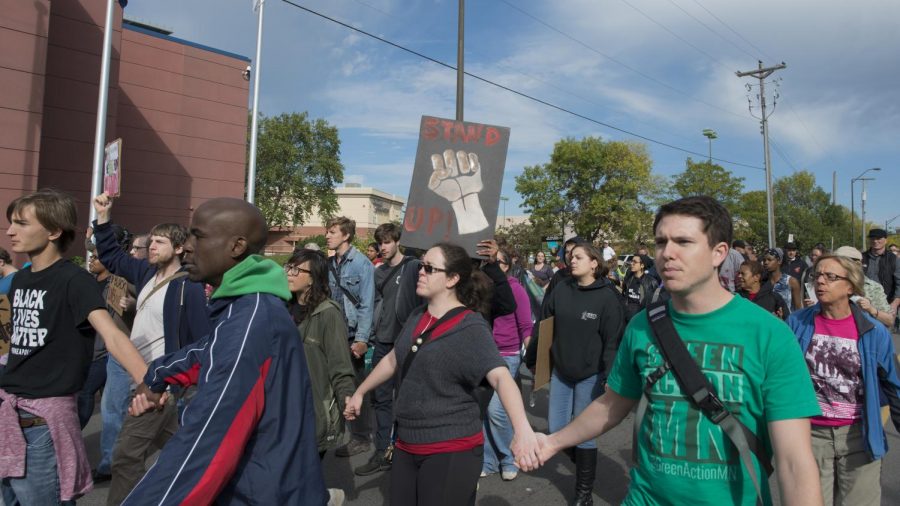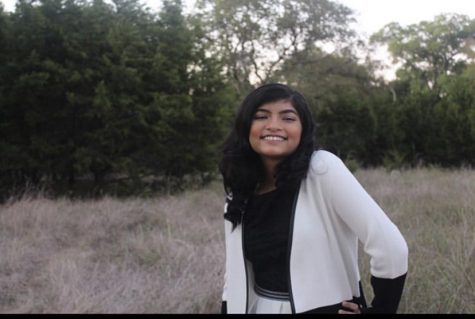The Trial of Amber Guyger Calls to Attention Our Flawed Justice System
Opinion
Fibonacci Blue
On Sept. 20, 2015, around 100 people gathered in St. Paul, Minnesota to protest police brutality by the Metro Transit Police against 17-year-old Marcus Abrams.
October 27, 2019
All he had done in that moment was eat some ice cream while watching a bit of television. That has never been a crime. Yet he was still shot.
This was the scene that led to the trial of Amber Guyger for her murder of Botham Jean that had all eyes watching. Guyger is a white former Dallas police officer who fatally shot her unarmed black neighbor, 26-year-old Botham Jean, on Sept. 6, 2018. The case garnered widespread attention for its bizarre circumstances; Guyger was off duty returning home when she walked into Jean’s apartment, mistakenly thinking it was her own, and seeing him as an intruder, shot him. Originally tried for the lesser crime of manslaughter, Guyger was eventually convicted of murder on Oct. 1, resulting in a 10-year sentence.
The case attracted controversy over multiple aspects, ranging from the obvious signs that Guyger had walked into the wrong home, to the insufficient aid she provided after shooting Jean, to the racist text messages she had sent in the past which suggested prejudice may have been a major factor of her crime. However, the underlying issues with the case that really drew the public’s attention were the trends of police brutality and how a broken justice system treats black Americans.
Defenders of Guyger claimed that she was justified in her use of force as she felt threatened and pulled the trigger out of fear. However, this defense highlights a major issue in our nation of our militarized system of policing. Laws for police officers give them room to use force if they feel there is a threat, but in many cases, such as Guyger’s, this allowance is used as a loophole to justify deadly actions stemming from racial prejudice.
The country must recognize that lethal force cannot be seen as the first response. Officers are half as likely to be convicted as their non-police peers, and this lack of accountability is emboldening many officers to act violently. This culture is furthered by the dangerous equipment the government provides to its officers which make these devastating occurrences an increasingly common reality. America must recognize that there are crucial problems within the law enforcement system, and if we don’t work against them, tragedies like the death of Botham Jean will continue to occur.
A central point of controversy in the case was Guyger’s charge of murder and her 10-year sentence. Some say that the sentence and charge were too extreme for what was an innocent mistake, and that she was treated too harshly because of her race.
However, this “reverse racism” mindset is a severe misunderstanding of the issue at hand. There are crucial disparities in how black people are treated by law enforcement and the justice system versus how white people are treated. African Americans are more likely to be incarcerated for drugs while not being more likely to be selling or using them. Studies have also shown proven racial bias by officers. In fact, black men are 2.5 times more likely to die in a cop interaction than their white male counterparts. Sadly, most of the time, the cops who take these fatal shots are let off lightly by the justice system. Why does the public call the justice system too harsh when a white police officer is charged, but often stay silent on the over-incarceration of and police brutality against black Americans?
Ignoring the inherently problematic instinct of many police officers to use force against minorities perpetuates this devastating cyclical violence. This is the reason we now see cases of innocents like Jean being seen as aggressors even when they are doing absolutely nothing.
The obvious bias with which the Guyger trial has been looked at is eye-opening. The fact that the nation was shocked by Guyger facing consequences for the murder of a young Botham Jean should be unsettling to us all. The trial and even the reactions towards the case demonstrate glaring instances of bias in how the narratives for white and black Americans are told. It shows a justice system that perpetuates prejudice, as well as a society willing to let the prejudice continue. While being the author of this piece, I have the privilege of not being directly attacked by this unjust system targeting minorities. Those like me should listen and support the people who are affected. We can’t keep allowing these unjust deaths to occur. We can’t keep ignoring the fact that the structures we have put in place allow these deaths to keep happening. Our nation needs to acknowledge the problem exists and take action by creating laws to solve these issues in our police and justice system. If we don’t, we will never achieve the transformation that needs to happen. America must wake up.



